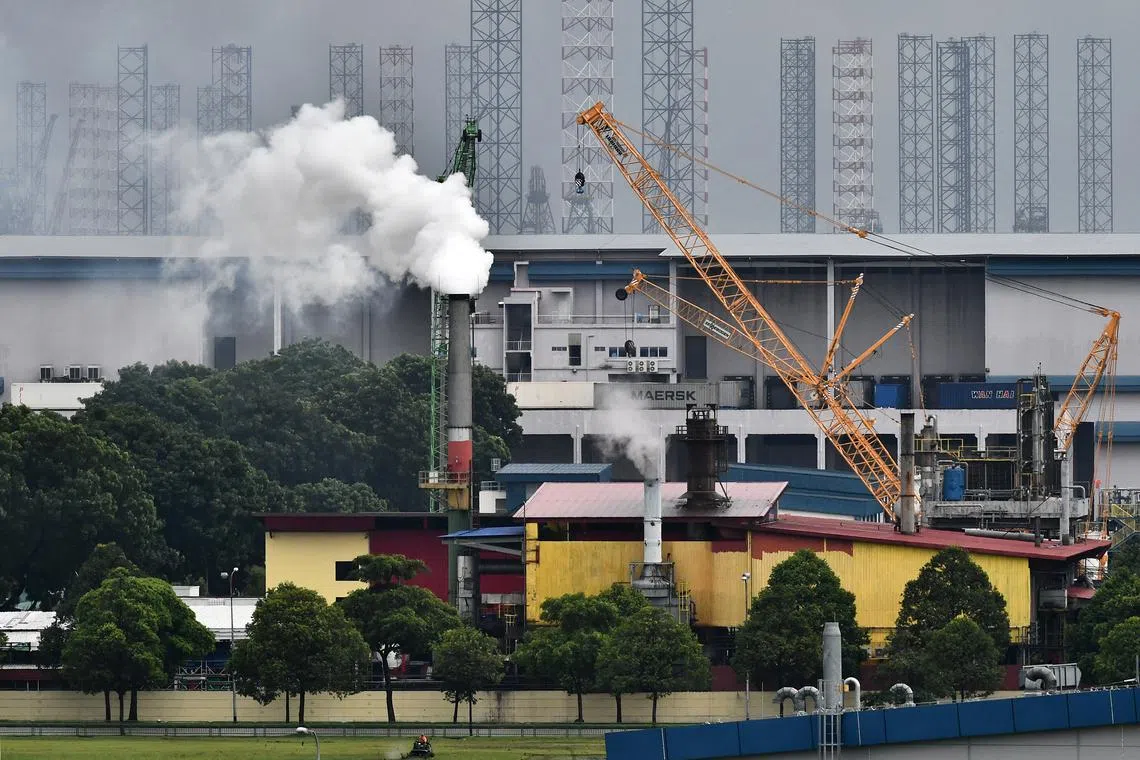MPs call for transparency on carbon emissions, protection for businesses in 4-hour debate on carbon tax
Sign up now: Get ST's newsletters delivered to your inbox

The Carbon Pricing (Amendment) Bill will raise the carbon tax from the current $5 per tonne to $25 from 2024 and $45 in 2026 and 2027.
PHOTO: ST FILE
Follow topic:
SINGAPORE – In raising carbon taxes, a balance must be struck between taking responsibility for planet-warming greenhouse gas emissions and protecting businesses, MPs said during a debate of more than four hours on Tuesday.
Twelve MPs from both sides of the House spoke on the second reading of the Carbon Pricing (Amendment) Bill that will raise the carbon tax from the current $5 per tonne
The Bill also allows companies in emissions-intensive trade-exposed (EITE) sectors such as the energy and chemicals sectors to have a portion of their carbon emissions untaxed to allow them to adjust to the higher rates.
During the debate, Workers’ Party (WP) MPs Leon Perera (Aljunied GRC), He Ting Ru (Sengkang GRC) and Louis Chua (Sengkang GRC), as well as People’s Action Party MP Louis Ng (Nee Soon GRC), called for some disclosure of companies’ use of these allowances or international carbon credits.
Echoing a suggestion proposed by some members of the public during the Ministry of Sustainability and the Environment’s public consultation on the Bill
“Moreover, given that the carbon tax imposes costs across the whole society and an allowance blunts the effect of that tax to some degree, there is a public interest in knowing who receives such awards to ensure accountability vis-a-vis the goals of the carbon tax. This helps ensure that any government of the day does not prop up certain companies for an unjustifiably long period of time, or even in perpetuity, for whatever reason,” he said.
While acknowledging that some company data could be sensitive, Mr Ng, who chairs the government parliamentary committee for sustainability and the environment, said: “There is no reason these names (of companies who receive allowances) should be a secret.
“They are clearly not a matter of commercial sensitivity and companies that do not receive such allowances will rightly wonder whether the government is secretly granting allowances to their rivals in the same sector.”
Meanwhile, Ms He and Mr Chua proposed an amendment to make public the decisions and rationale by a minister to lift the prescribed limit for international carbon credits to offset taxable emissions, as provided for under the Bill.
While the use of eligible credits will be capped at 5 per cent of taxable emissions from 2024 onwards, a minister has the discretion to allow a party to use credits above this limit.
This creates the danger of businesses turning their efforts to purchasing favourable international carbon credits instead of cutting their own emissions, said Ms He, adding that being upfront about the reasons for allowing businesses to use more carbon credits will also convey that the decision was a carefully considered one.
These proposals by the WP mark the second time the party has filed amendments to a Bill in Parliament in the past 10 years, the first being the Foreign Interference (Countermeasures) Act in 2021.
In reply, Minister for Sustainability and the Environment Grace Fu said that to make public the instances where the Government decides to lift the prescribed limit for carbon credits would breach the confidentiality of carbon tax data, which companies are accorded under the Carbon Pricing Act.
Ms Fu said: “For accountability to their stakeholders, we encourage all companies to size, to analyse, and to publish their environmental impact to explain how they are managing emissions-related risks, in relation to their commitment to decarbonisation.”
Ms Poh Li San (Sembawang GRC), Mr Don Wee (Chua Chu Kang GRC) and Nominated MP Janet Ang also noted that the hike in the carbon tax should not come at a hefty cost to home-grown businesses that need more time or help to decarbonise.
Ms Poh said: “For companies outside the EITE sectors, given that Singapore’s transition to cleaner green energy may only materialise well beyond 2030, how will companies whose carbon emissions result mainly from the brown electricity needed for their operations be assisted in the next decade?
“These companies may be paying both higher electricity tariffs due to the current energy crisis as well as increased carbon taxes for the carbon emissions generated.”
Meanwhile, WP MP Jamus Lim (Sengkang GRC) suggested that the Government allow for a flexible carbon tax that could be adjusted according to economic conditions.
This sparked criticism from Ms Fu, who said that Associate Professor Lim’s suggestion was “hard to implement” owing to difficulties in anticipating external factors such as the Covid-19 pandemic, among other things.
There ensued a heated 10-minute exchange between the minister and Prof Lim on the matter, which led to Leader of the Opposition Pritam Singh interjecting to remind Ms Fu that when a member asks a question, the other member has to sit down.
As the Bill was tabled, the WP’s amendments that had fiscal implications, including stricter limits for allowances, were not put to a vote as they did not have the President’s recommendation.
To Mr Perera, who sought clarification on this, Leader of the House Indranee Rajah said the Government had chosen not to put forward the amendments for recommendation as it could not support them on their merits.
She said: “And this is perfectly in order as the constitutional requirement for the President’s recommendation to be sought for amendments with financial implications is a procedure that safeguards the Government’s financial initiative. The President would act in accordance with the Government’s advice in giving or not giving the required recommendation.“

